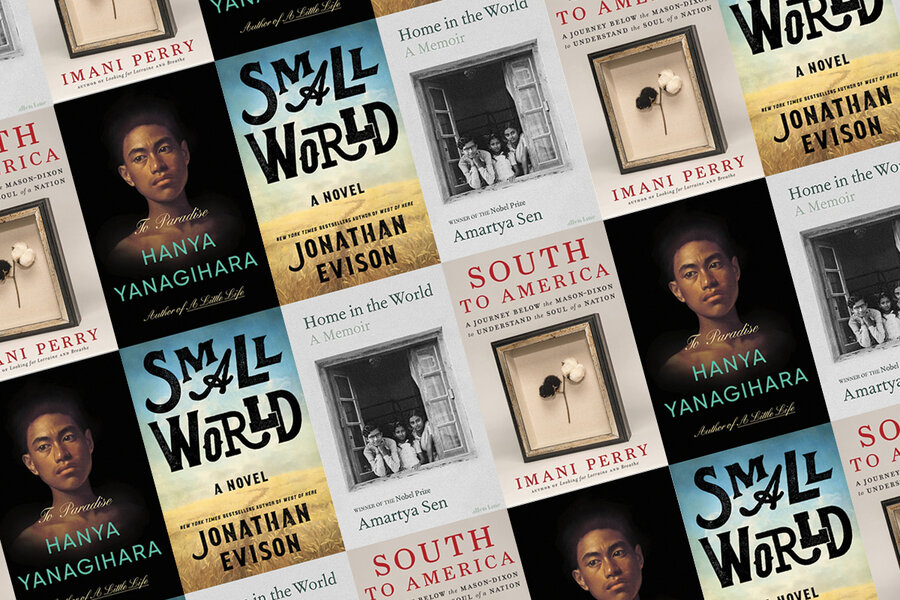Cozying up with the 10 best books of January
Loading...
“And now let us believe in a long year that is given to us, new, untouched, full of things that have never been,” wrote Austrian poet and novelist Rainer Maria Rilke (1875-1926).
For avid readers, nothing is better than opening a new, untouched book, full of things one has never encountered. In that spirit, and to kick off a new year of reading, we offer recommendations for the latest books that provide insights, illumination, and fresh voices.
Why We Wrote This
Our top picks for this month include books about striving to realize the American dream, looking beyond old patterns, searching for answers to racial divisions in America, and celebrating the lives of creative individuals.
In the realm of fiction, the immigrant narrative dominates, with an epic novel about the American dream and a collection of short stories that explore the Chinese diaspora.
Nonfiction titles include a Nobel Prize-winning economist’s compassionate memoir of growing up in India, a Black American woman’s observations on her travels in the Deep South, and a biography of two titans of American architecture and design.
Engaging with the world, as these books demonstrate, can be both an enjoyable and a bracing experience. Understanding the struggles as well as the joys and aspirations of people near and far gives readers an opportunity to empathize with others, as well as celebrate our common humanity.
1. Small World by Jonathan Evison
Jonathan Evison’s Dickensian-style retelling of America’s history is a modern classic. His love for his characters glows in portrayals of Irish and Chinese immigrants, Native Americans, and enslaved people all yearning to belong. The book is a vast yet intimate tale about the American dream, and the people for whom the vision is yet unfulfilled.
Why We Wrote This
Our top picks for this month include books about striving to realize the American dream, looking beyond old patterns, searching for answers to racial divisions in America, and celebrating the lives of creative individuals.
2. To Paradise by Hanya Yanagihara
Three books packed into one, “To Paradise” presents an archeological dig of a story – in reverse. Characters gay and straight, driven and aimless, tied to home or flung afar, struggle with questions of legacy and inheritance. Whether dwelling in a Utopian 1890s New York, mid-20th-century Hawaii, or a martial law-throttled, pandemic-pocked future, each must decide whether to follow their fathers or “find a new template.”
3. Thank You, Mr. Nixon by Gish Jen
Gish Jen’s latest collection begins with a Chinese saying: “A long journey begins with a step.” Readers could add, gratefully: “And ends with a story.” There are 11 here – starting with President Nixon’s visit to China in the 1970s and progressing to the pandemic-shaped present. With humor and pathos, the stories feature intertwined mainland, immigrant, and Hong Kong characters confronting cultural and political changes.
4. The Paris Bookseller by Kerri Maher
Kerri Maher’s enchanting historical novel follows American Sylvia Beach, founder of the storied Paris bookshop Shakespeare and Company, as she opens her doors in 1919 and then courageously commits to publishing her friend James Joyce’s “Ulysses,” which had been banned in the United States. (Read the full review here.)
5. Honor by Thrity Umrigar
In Thrity Umrigar’s engrossing (and sometimes graphic) novel of modern-day India, an interfaith couple, an honor killing, a court case, and an American-born Indian journalist seeking justice, all come together in two brave love stories that honor the desire for unconditional acceptance.
6. Violeta by Isabel Allende
A South American centenarian describes her life’s surprises, loves, and sorrows via letters to her grandson. Although uneven, Isabel Allende’s hard-to-put-down novel delivers nuanced characters – including many strong women – and astute reflections about political and social change.
7. Home in the World by Amartya Sen
Economist Amartya Sen won the Nobel Prize for his visionary work on poverty, inequality, and famine. Now, in this graceful and hopeful memoir, he reveals the roots of his economic theories in his formative years in India and England.
8. South to America by Imani Perry
Alabama native Imani Perry examines the outsized impact of the South on the American consciousness. It’s a perfect read for those who are hungry for knowledge about how the South came to be so dominant in the country’s history.
9. Lorraine Hansberry by Charles J. Shields
Lorraine Hansberry wrote the 1959 play “A Raisin in the Sun” when she was just 28. In this rich, edifying biography, Charles J. Shields situates the playwright’s short life in the context of the Great Migration, leftist politics, and issues of race, class, and sexuality, all leading up to the production of her dramatic masterpiece.
10. Architects of an American Landscape by Hugh Howard
Hugh Howard examines the lives of two early titans of American design: Frederick Law Olmsted and Henry Hobson Richardson. The purity of nature animated Olmsted’s work, which included New York’s Central Park. Richardson’s commissions included Boston’s Trinity Church. The book offers insights into two classic American artists.







